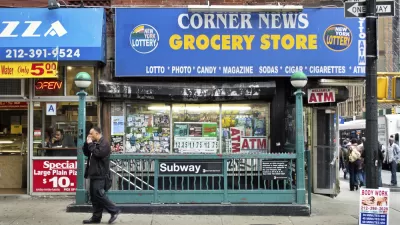Denver joined cities around the country this summer by targeting its corner stores as potential solutions for its food desert challenges.
Colleen O'Connor reports on the Healthy Corner Store Initiative, a Denver pilot program that has already been implemented at five corner stores. The program launched in August, led by the city and county of Denver's Department of Environmental Health, funded by a grant of more than $327,000 from the Colorado Health Foundation.
According to O'Connor, "[the] plan is to implement the economic-development model in 50 corner stores throughout these neighborhoods over the next three years, helping the small-business owners by providing technical assistance to help carry more healthy products while promoting positive messages about nutritious foods in their stores. Other organizations in the neighborhood also offer classes in nutrition and healthy cooking." The Denver Healthy Corner Store Initiative is based on the model provided by the Philadelphia Healthy Corner Store Initiative.
The Healthy Corner Store Initiative is part of a larger effort to address the city's food deserts. Earlier this month, for instance, the "Denver Office of Economic Development announced help for the Westwood neighborhood, also a food desert, with a $1.2 million performance-based loan to the nonprofit Re:Vision for development of a food cooperative."
FULL STORY: Corner stores in NE Denver part of pilot program for food deserts

Trump Administration Could Effectively End Housing Voucher Program
Federal officials are eyeing major cuts to the Section 8 program that helps millions of low-income households pay rent.

Planetizen Federal Action Tracker
A weekly monitor of how Trump’s orders and actions are impacting planners and planning in America.

The 120 Year Old Tiny Home Villages That Sheltered San Francisco’s Earthquake Refugees
More than a century ago, San Francisco mobilized to house thousands of residents displaced by the 1906 earthquake. Could their strategy offer a model for the present?

HSR Reaches Key Settlement in Northern California City
The state’s high-speed rail authority reached an agreement with Millbrae, a key city on the train’s proposed route to San Francisco.

Washington State Legislature Passes Parking Reform Bill
A bill that would limit parking requirements for new developments is headed to the governor’s desk.

Missouri Law Would Ban Protections for Housing Voucher Users
A state law seeks to overturn source-of-income discrimination bans passed by several Missouri cities.
Urban Design for Planners 1: Software Tools
This six-course series explores essential urban design concepts using open source software and equips planners with the tools they need to participate fully in the urban design process.
Planning for Universal Design
Learn the tools for implementing Universal Design in planning regulations.
Ada County Highway District
Clanton & Associates, Inc.
Jessamine County Fiscal Court
Institute for Housing and Urban Development Studies (IHS)
City of Grandview
Harvard GSD Executive Education
Toledo-Lucas County Plan Commissions
Salt Lake City
NYU Wagner Graduate School of Public Service




























